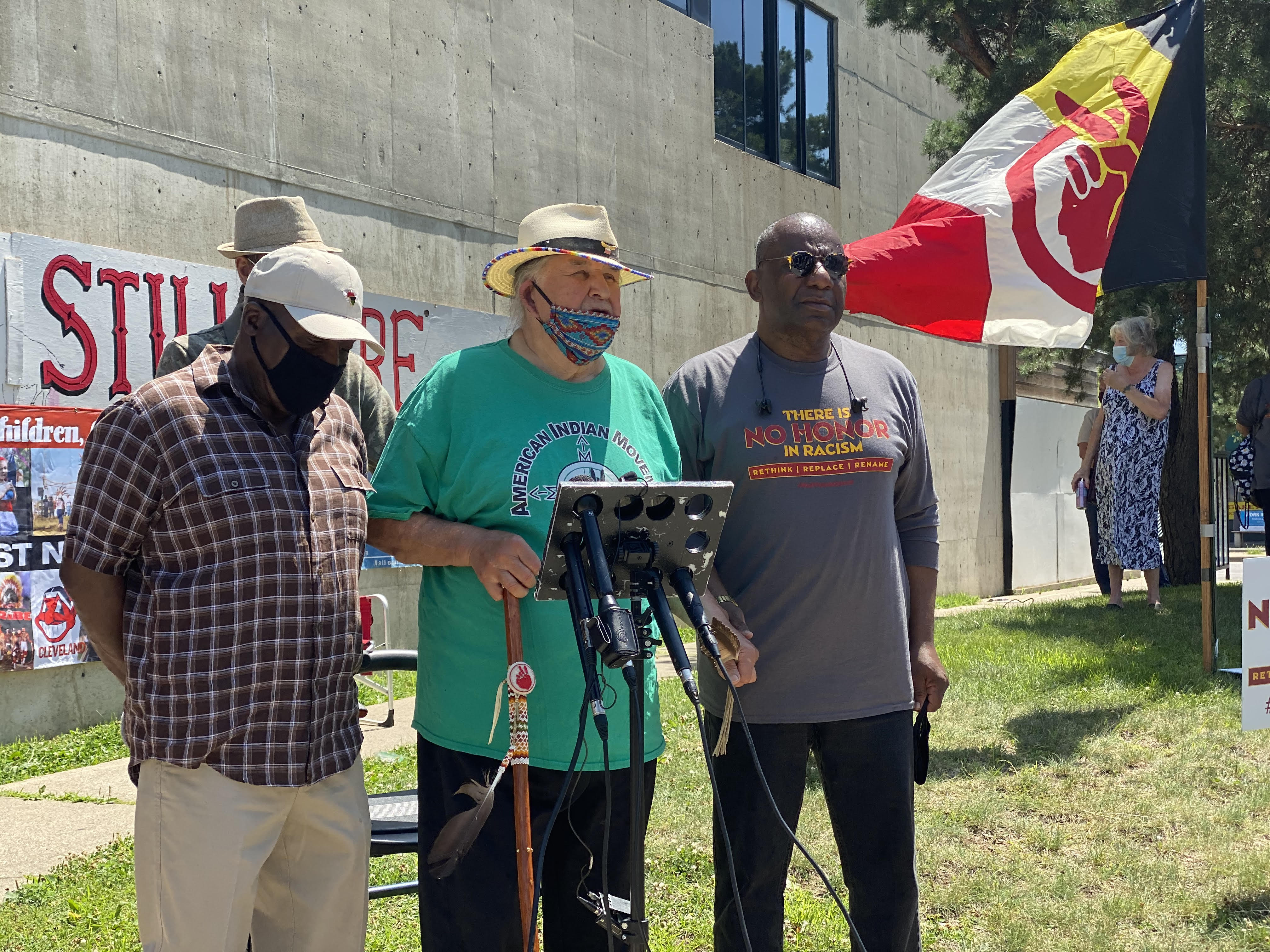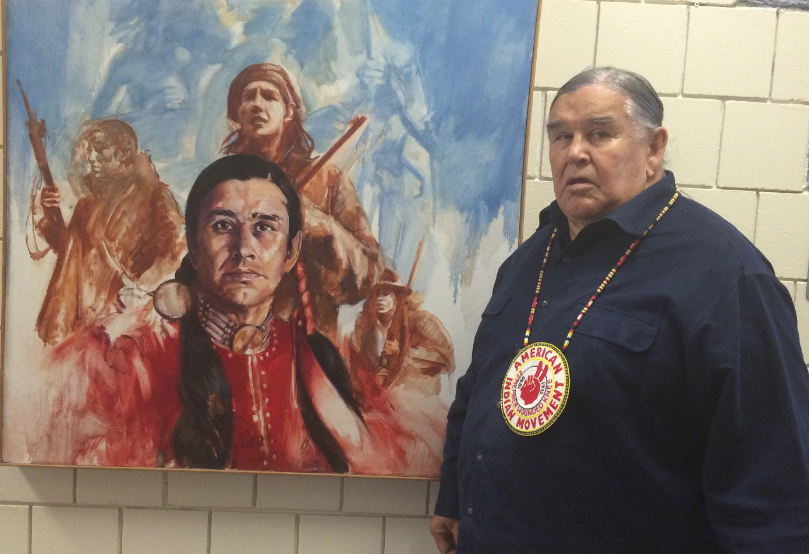
- Details
- By Darren Thompson
MINNEAPOLIS — Clyde Bellecourt, one of the original founders of the American Indian Movement (AIM), passed away today due to complications with cancer, according to Lisa Bellanger, Co-Director of the American Indian Movement’s Grand Governing Council. His Ojibwe name is Nee-gon-we-way-we-dun—“Thunder Before the Storm." He was 85 years old.
Along with Dennis Banks, Eddie Benton-Benai, and George Mitchell, Clyde Bellecourt co-founded the American Indian Movement in Minneapolis, Minnesota in 1968. In its beginning, the American Indian Movement aimed to address systemic issues of poverty, discrimination, and police brutality against urban American Indians.
Bellecourt and AIM were involved in many highly publicized protests including the Trail of Broken Treaties, a cross-country march to Washington, D.C., to reignite federal-tribal nations' treaties and relations, and the Wounded Knee Occupation, where approximately 200 Oglala Lakota and the American Indian Movement seized and occupied the town of Wounded Knee, SD for 71 days. AIM also participated in the Occupation of Alcatraz (1969-1971).
Bellecourt participated in the Wounded Knee Occupation, which eventually went to receive international press coverage. At Wounded Knee, Bellecourt became a negotiator, where Russell Means, Carter Camp, and Bellecourt eventually held a meeting with an official representative for the U.S. President to discuss the federal government’s Indian policy.

After leaving Wounded Knee, Bellecourt and Russell Means were arrested in Pierre, South Dakota for participating in the Wounded Knee Occupation and the court set bond at $25,000. Upon release, Bellecourt and Means were served a restraining order that neither could be within five miles to the town of Wounded Knee. While released on bond, Bellecourt and Means went on a fundraising tour across the United States, to raise money for the Wounded Knee Occupation.
Bellecourt’s lifelong activism was his dedication to his community. Bellecourt also founded the Heart of the Earth Survival School in 1972, and the American Indian Opportunities Industrialization Center (AIOIC) in 1979. Both were founded to address the education and employment disparities faced by American Indians in the Minneapolis urban area. He was committed to removing racist Native mascots and names. After the Washington Football Team announced the removal of its mascot, Bellecourt said at the press conference, “People laughed at us, said that wasn’t important, there's more important issues. But if we cannot deal with racism, we cannot do anything.”
"Today, we lost a civil rights leader who fought for more than a half century on behalf of Indigenous people in Minnesota and around the world," said Minnesota Lieutenant Governor Peggy Flanagan in a statement to Native News Online. "Indian Country benefited from Clyde Bellecourt's activism - he cleared a path for so many of us. Few have advocated harder and longer than he did, and we are indebted for that work. As a co-founder of the American Indian Movement, he fought for the visibility and fair treatment of Native people. Minneapolis has one of the most robust and vibrant networks of organizations serving the urban Indian community in the country, and that is because of Clyde and his work."
Other organizations founded in part by Bellecourt include the Elaine M. Stately Peacemaker Center for Indian youth; the AIM Patrol, which provided security for the Minneapolis Indian community during the riots after the murder of George Floyd in 2020.
He was inspired to co-found AIM in the late 1960s when he saw what happened to families offered opportunities to leave Indian reservations with moving expenses paid for to certain government-designated cities where they were promised vocational training and competitive jobs, as part of the Indian Relocation Act of 1956. Upon arrival to urban cities, many American Indian families didn’t receive the services they were promised, which led to poverty, joblessness, and homelessness, along with mistreatment by law enforcement, discrimination in housing and employment, and weakened tribal ties. AIM served its community by advocating for fair treatment in housing and education, monitoring law enforcement’s interactions with American Indian people, and to influence pride in Indian culture during a time the dominant culture was aimed at stripping Indian culture.
In November 2016, The Thunder Before the Storm: The Autobiography of Clyde Bellecourt with Jon Lurie was published by the Minnesota Historical Society Press.
As an elder, Bellecourt participated in the Standing Rock resistance in 2016.
" ...[W]hen I think about him walking on, it's also clear to see the ways in which his legacy will live on through so many of us," said Flanagan. "Journey well, Neegawnwaywidung."
Funeral arrangements will be announced by the family. This is a continuing story.
Neely Bardwell contributed to this article.
More Stories Like This
Native News Weekly (August 25, 2024): D.C. BriefsUS Presidents in Their Own Words Concerning American Indians
Native News Weekly (December 7, 2025): D.C. Briefs
Why We Report: Chez Oxendine Shares His Story for Native News Online’s Year-End Campaign
New Amnesty International Report Details Torture, Overcrowding at Krome and ‘Alligator Alcatraz’
Help us defend tribal sovereignty.
At Native News Online, our mission is rooted in telling the stories that strengthen sovereignty and uplift Indigenous voices — not just at year’s end, but every single day.
Because of your generosity last year, we were able to keep our reporters on the ground in tribal communities, at national gatherings and in the halls of Congress — covering the issues that matter most to Indian Country: sovereignty, culture, education, health and economic opportunity.
That support sustained us through a tough year in 2025. Now, as we look to the year ahead, we need your help right now to ensure warrior journalism remains strong — reporting that defends tribal sovereignty, amplifies Native truth, and holds power accountable.
 The stakes couldn't be higher. Your support keeps Native voices heard, Native stories told and Native sovereignty defended.
The stakes couldn't be higher. Your support keeps Native voices heard, Native stories told and Native sovereignty defended.
Stand with Warrior Journalism today.
Levi Rickert (Potawatomi), Editor & Publisher
